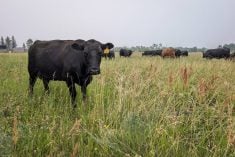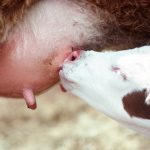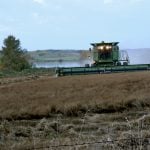Russia’s new zero-tolerance net on residue from a growth-promoting feed additive has snagged frozen pork from two Canadian plants, both of which now face "temporary restrictions" on future shipments.
Rosselkhoznadzor, Russia’s federal service for veterinary and phytosanitary surveillance, announced Wednesday it has notified Canada’s chief veterinary officer, Dr. Ian Alexander, of the suspensions on the Aliments Asta pork slaughter plant at St-Alexandre, Que., and on Quality Meat Packers in Toronto.
The agency said its "enhanced laboratory control" over shipments from the two plants had turned up ractopamine — a medicated feed premix that’s used to boost meat yield in hogs and cattle, and is sold to hog producers in Canada by Elanco under the name Paylean 20.
Read Also

U.S. livestock: Cattle futures mixed
Cattle futures on the Chicago Mercantile Exchange were mixed on Thursday, after dropping sharply the previous session. The December live…
Rosselkhoznadzor said it had already imposed "enhanced laboratory control" over those two facilities in August last year and would now impose "temporary restrictions on import of products" from both.
Also on Wednesday, the agency announced it would impose "enhanced laboratory control" for four other Canadian pork plants, but would not yet restrict their shipments, due to findings of ractopamine in frozen pork.
The four other plants include the Maple Leaf Foods plant at Brandon, Man.; Fearmans Pork at Burlington, Ont.; Great Lakes Specialty Meats of Mitchell, Ont.; and Atrahan Transformation at Yamachiche, Que.
The four facilities get a warning from the agency "due to initial detection of violations," Rosselkhoznadzor said.
Rosselkhoznadzor announced import restrictions the same day for pork from the John Morrell slaughter plant at Sioux Falls, S.D., along with "enhanced laboratory control" for two Brazilian facilities.
Canada Pork International last month pledged that all Canadian pork exports destined for Russia would be tested, starting Dec. 7, to ensure they are free of ractopamine.
The Canadian Food Inspection Agency has not changed its own procedures and tests for meat exports to Russia. Federal Agriculture Minister Gerry Ritz said last month that the government instead wants to ensure Russia understands a zero-tolerance policy on ractopamine residue "is not science-based."
A zero-tolerance rule on ractopamine in imported meat steps beyond the position of the Codex Alimentarius Commission, the United Nations-sponsored body whose standards are the commonly-accepted international reference points for food safety.
Codex last July approved maximum residue limits for ractopamine in pork and beef, as well as an acceptable daily rate of intake of the drug for hogs and cattle.
Related stories:
Pork shippers to meet Russia’s new requirement, Dec. 20, 2012
Russia-bound meat to require testing for ractopamine, Dec. 10, 2012
















